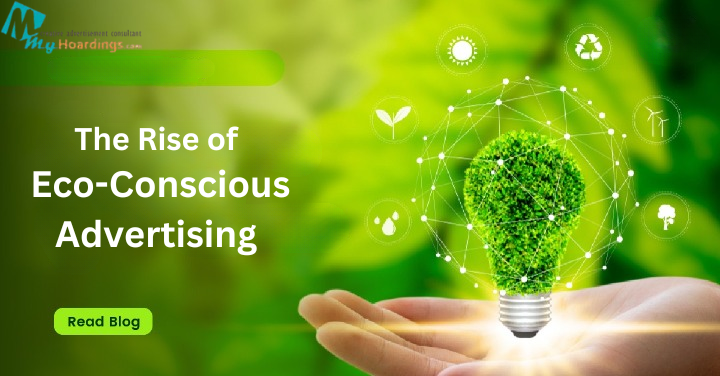The Rise of Eco-Conscious Advertising
4 min read
The Rise of Eco-Conscious Advertising
In recent years, brands have increasingly embraced eco-conscious advertising as consumers become more aware of environmental issues and demand more sustainable practices from businesses. Eco-conscious advertising, also known as green advertising or sustainable advertising, refers to the promotion of products, services, or initiatives that highlight environmental benefits, sustainable practices, and ethical business operations. At MyHoardings, we understand the importance of aligning with these global trends and can help brands craft impactful eco-conscious campaigns that resonate with today’s environmentally aware audience.

Why Eco-Conscious Advertising is on the Rise
- Changing Consumer Preferences Modern consumers, particularly millennials and Gen Z, are more environmentally conscious than ever before. They actively seek out brands that prioritize sustainability and expect transparency in business practices. According to studies, a significant portion of consumers are willing to pay a premium for products and services that are environmentally friendly. This has prompted companies to integrate sustainability into their advertising strategies.
- Global Environmental Movements The rise of environmental movements such as Fridays for Future and the Zero Waste lifestyle have placed sustainability at the forefront of societal discussions. Brands are responding to this shift by adopting greener business practices and showcasing them in their marketing. Major environmental crises like climate change, plastic pollution, and deforestation have also fueled consumer demand for eco-conscious alternatives.
- Corporate Social Responsibility (CSR) Many businesses are now focusing on corporate social responsibility (CSR) initiatives, which include reducing carbon footprints, sourcing eco-friendly materials, and supporting environmental causes. Companies are using advertising to communicate these efforts and position themselves as responsible, forward-thinking brands.
Key Features of Eco-Conscious Advertising
- Highlighting Sustainability Efforts Eco-conscious ads often highlight specific sustainability efforts, such as reducing waste, using renewable energy, or cutting down on carbon emissions. Brands like Patagonia and The Body Shop are known for using advertising to promote their ethical sourcing practices and eco-friendly products. These ads help consumers feel good about supporting environmentally responsible brands.
- Emphasizing Eco-Friendly Products Many brands are designing new product lines that focus on sustainability, such as biodegradable packaging, ethically sourced materials, and energy-efficient technologies. Eco-conscious advertising showcases these innovations to attract eco-minded consumers. For example, Tesla uses its marketing to promote electric vehicles as a sustainable alternative to traditional cars.
- Encouraging Behavior Change Eco-conscious advertising can also encourage consumers to adopt greener lifestyles. Campaigns promoting energy conservation, recycling, or reducing plastic use help create awareness and inspire positive behavior changes. Brands that align their values with sustainability often lead this charge, fostering consumer loyalty through shared ideals.
- Avoiding Greenwashing One challenge in eco-conscious advertising is ensuring transparency and authenticity. Greenwashing, or falsely claiming environmental benefits, can lead to consumer backlash and damage a brand’s reputation. Advertisers must ensure that their green claims are credible, backed by tangible actions, and supported by third-party certifications when necessary.
Examples of Eco-Conscious Advertising
- IKEA’s “Better Living” Campaign: IKEA promotes sustainable living through its eco-conscious campaigns that focus on waste reduction, energy efficiency, and affordable eco-friendly products.
- Unilever’s Sustainable Living Brands: Unilever has integrated sustainability into its brands like Dove, Hellmann’s, and Ben & Jerry’s, emphasizing how these products contribute to environmental protection.
- Patagonia’s Environmental Activism: Known for its deep commitment to the environment, Patagonia’s ads often focus on encouraging consumers to buy fewer products and repair or recycle existing ones.
The Benefits of Eco-Conscious Advertising
- Building Trust and Loyalty: Consumers are more likely to support brands that align with their personal values, especially when it comes to sustainability. Eco-conscious advertising helps brands build trust and long-lasting customer loyalty by showcasing their commitment to protecting the planet.
- Attracting a New Audience: As the demand for sustainable products grows, eco-conscious advertising allows brands to tap into a growing market of environmentally aware consumers. Companies that embrace green practices can differentiate themselves in a competitive marketplace.
- Boosting Brand Reputation: Brands that promote sustainability through their advertising not only enhance their image but also contribute to a positive perception of their industry. By leading the charge in environmental responsibility, businesses can enhance their overall reputation and brand equity.

MyHoardings: Your Partner in Eco-Conscious Advertising
At MyHoardings, we believe in the power of advertising to drive positive change. We work with brands that share our commitment to sustainability and help them create campaigns that not only resonate with eco-conscious consumers but also have a lasting impact on the planet. Whether you’re launching a new green product or showcasing your company’s environmental initiatives, we can help you craft an eco-conscious advertising strategy that delivers results.
Contact Us
Email: business@myhoardings.com
Phone: +91-9953847639
Website: www.myhoardings.com



